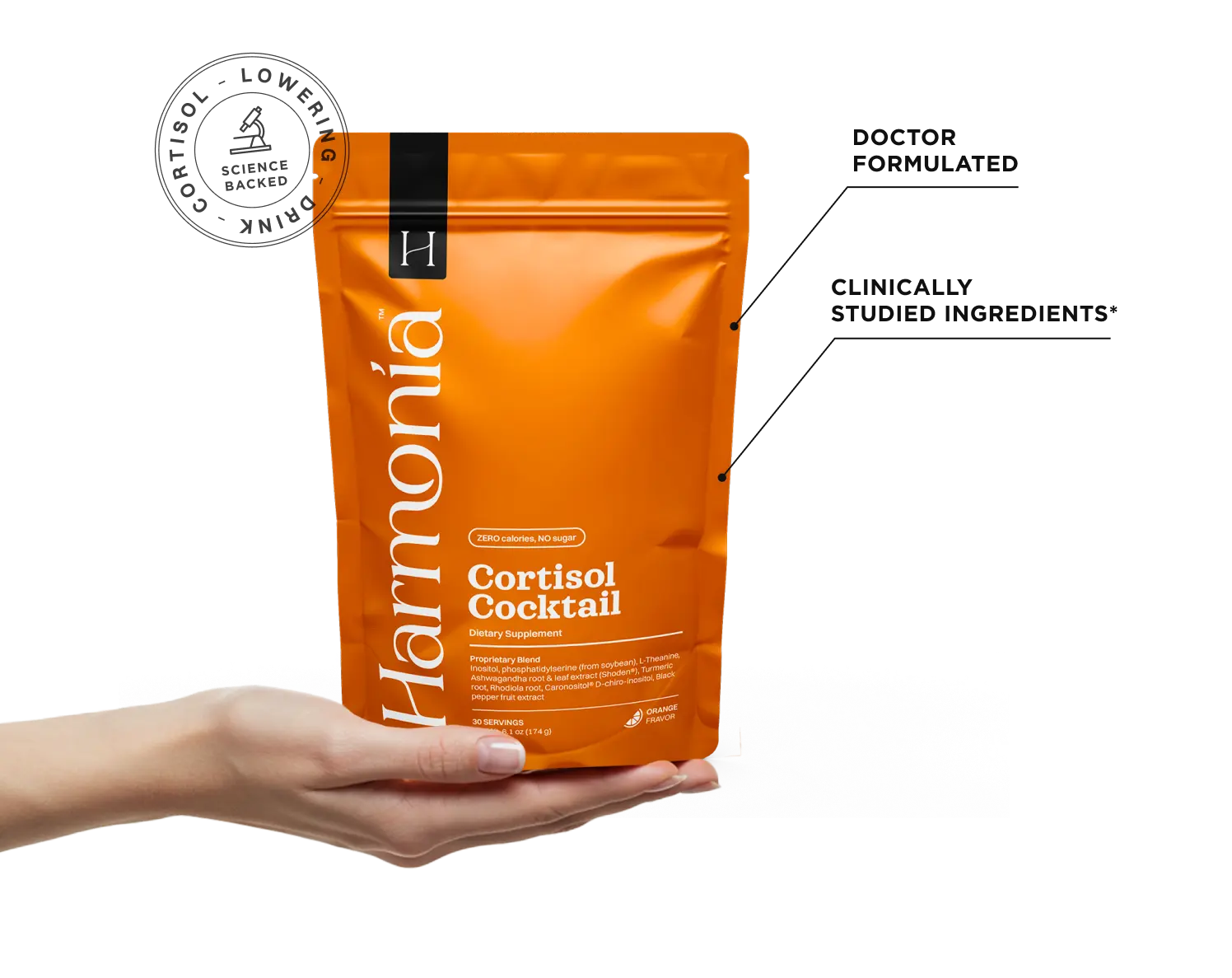Anxiety isn’t just a state of mind - it’s a signal from the body that something deeper is out of balance. For many women, that imbalance begins with their hormones.
Polycystic Ovary Syndrome (PCOS) is often described as a reproductive or metabolic condition, but its reach goes far beyond the physical. Behind the irregular cycles, skin changes, or energy crashes, there’s often an emotional undercurrent that’s harder to talk about: persistent worry, restlessness, or even panic that seems to appear without reason.
Researchers now know that hormones and mood are closely linked, and when the endocrine system is disrupted - as it often is with PCOS - the brain’s stress response changes too.
If you’ve ever felt your mood shift along with your hormones, you’re not imagining it. Understanding how PCOS and anxiety interact is key to feeling emotionally grounded again - and the process starts by learning how to calm the hormonal chaos driving the cycle.
Understanding PCOS and Anxiety
Polycystic Ovary Syndrome (PCOS) is a common endocrine disorder that affects up to 10% of women of reproductive age, according to clinical studies.
It’s typically known for physical symptoms such as irregular menstrual cycles, acne, ovarian cysts, or weight fluctuations. Yet, beyond these visible signs, PCOS often carries a quieter but equally significant burden - its effect on mental health.
Hormonal imbalance is central to PCOS. The condition disrupts the normal production and interaction of estrogen, progesterone, and insulin, three hormones that help regulate energy, mood, and metabolism.
When these hormones shift out of balance, the body often produces higher levels of cortisol, the primary stress hormone. Over time, this state of heightened cortisol can intensify anxiety and emotional sensitivity.
Women with PCOS frequently report symptoms such as:
- Persistent tension or a feeling of being “on edge”
- Restlessness or difficulty relaxing
- Trouble falling or staying asleep
- Mood swings and irritability
- Episodes of panic or racing thoughts
- Emotional exhaustion and low motivation
These experiences are not simply psychological - they are rooted in biology. The constant hormonal fluctuations of PCOS can keep the nervous system in a chronic fight-or-flight state, where the body struggles to return to equilibrium.
Elevated cortisol, combined with insulin resistance and inflammation, amplifies the stress response and affects neurotransmitters like serotonin and GABA, which play key roles in calmness and emotional balance.
Understanding this connection between stress and PCOS is essential. It explains why anxiety can be more pronounced in women with PCOS and highlights the importance of supporting not just reproductive health, but the entire hormone–mind axis that shapes emotional well-being.
How Is PCOS Related to Mental Health?

Polycystic Ovary Syndrome (PCOS) is far more than a reproductive or metabolic disorder - it’s a whole-body hormonal condition that influences nearly every aspect of health, including mental and emotional well-being.
The relationship between PCOS and mental health is complex and multidirectional, meaning that hormonal changes can affect mood, and emotional stress can, in turn, worsen hormonal imbalance.
Studies show that women with PCOS are significantly more likely to experience anxiety, depression, and emotional distress than those without the condition.
This is due to the intricate interaction between hormones, brain chemistry, and lifestyle factors that collectively shape how the body responds to stress.
1. Hormones and the Brain
Hormones such as estrogen, progesterone, insulin, and cortisol play essential roles in regulating the brain’s neurotransmitters - particularly serotonin, dopamine, and GABA.
- Estrogen supports serotonin production, which stabilizes mood and promotes a sense of calm.
- Progesterone has a naturally soothing effect on the nervous system, acting somewhat like the body’s built-in anti-anxiety hormone.
When these hormones fluctuate - as they frequently do in PCOS - emotional balance can be disrupted.
Additionally, elevated cortisol, the stress hormone, overstimulates the brain’s threat response system, leading to persistent worry, restlessness, and a sense of internal pressure.
Over time, this hormonal pattern can make it harder to cope with everyday stressors and increase susceptibility to anxiety and depressive symptoms.
2. Sleep and Emotional Stability
Sleep and hormone health are deeply connected. Women with PCOS often experience poor sleep quality or insomnia due to elevated cortisol, insulin resistance, and changes in melatonin production.
When the body doesn’t get restorative rest, neurotransmitters like serotonin and dopamine are depleted, making it harder to regulate emotions or recover from stress.
This creates a cycle where sleep loss raises cortisol, which further disrupts hormone balance - reinforcing anxiety, irritability, and fatigue. Addressing sleep hygiene is therefore one of the most effective ways to improve both mental health and PCOS symptoms simultaneously.
3. Body Image, Self-Esteem, and Emotional Stress
The visible symptoms of PCOS - such as weight fluctuations, acne, or hair growth/loss - can significantly impact self-image and confidence.
Many women report feelings of frustration, embarrassment, or isolation when managing these changes. The constant emotional toll of trying to “fix” these symptoms can contribute to social withdrawal, body dissatisfaction, and stress-induced anxiety.
When self-esteem declines, cortisol tends to rise, intensifying the body’s stress response and perpetuating the emotional symptoms of PCOS. Recognizing these struggles as hormone-driven rather than personal failures is an important step toward emotional healing.
4. The Link Between PCOS, Depression, and Anxiety
Multiple studies have confirmed that women with PCOS are at a two - to threefold higher risk of experiencing anxiety and depression compared to women without the condition.
Researchers suggest that both biological and psychological factors are involved:
- Hormonal fluctuations affect the brain’s reward and motivation centers.
- Chronic inflammation alters neurotransmitter signaling.
- Stress about fertility, appearance, or long-term health outcomes can trigger emotional exhaustion.
Without addressing both the physical and emotional dimensions of PCOS, many women remain caught in a cycle of stress, fatigue, and anxiety.
When viewed as a whole, it becomes clear that mental health and PCOS are inseparable. Supporting one automatically benefits the other.
A balanced approach - focusing on hormone regulation, sleep, nutrition, and stress reduction - can help restore calm, improve emotional resilience, and enhance overall quality of life.
Why Is Anxiety More Common in Women with PCOS?

Women with PCOS experience complex hormonal patterns that make their bodies more sensitive to stress. Here’s what’s happening beneath the surface:
- Cortisol Overload: Chronic stress elevates cortisol levels, making it harder to relax, sleep, and regulate mood. In women with PCOS, cortisol stays high for longer, which can increase anxiety and fatigue.
- Insulin Resistance and Mood: Many women with PCOS experience insulin resistance, which affects blood sugar and energy levels. Sudden drops in blood sugar can trigger irritability, nervousness, or even panic sensations.
- Estrogen and Progesterone Imbalance: Low progesterone and fluctuating estrogen can disrupt brain chemicals like serotonin and GABA, both essential for calm and stability.
- Chronic Inflammation: PCOS often involves inflammation that affects neurotransmitters, further influencing mood and anxiety levels.
When these factors combine, it’s easy to understand why PCOS causes anxiety more frequently in women - not just as a psychological reaction, but as a hormonal reality.
Natural PCOS Anxiety Treatment: Balancing Hormones and Mind
While medication can play an important role for some, many women find that lasting relief from PCOS-related anxiety comes from addressing its root causes - hormonal imbalance, elevated cortisol, and chronic stress. Supporting your body’s natural rhythm helps restore emotional stability and improve overall well-being.
Below are evidence-based lifestyle strategies that can help balance both hormones and mood, along with ways Harmonia’s adaptogenic blend can support your progress.
1. Nourish Your Body with Balance
A stable blood sugar response is one of the most effective ways to calm the stress response. Meals that combine lean protein, healthy fats, and fiber help regulate insulin and cortisol, two hormones closely tied to anxiety in women with PCOS.
Avoiding refined sugars and processed foods can prevent sharp glucose spikes that trigger mood swings or fatigue. Nutrients like magnesium, B vitamins, and inositol are especially beneficial for women with PCOS, as they support hormone metabolism and brain chemistry.
Harmonia contains Myo-Inositol and D-Chiro Inositol, key ingredients clinically shown to help stabilize insulin sensitivity and support emotional balance - making it a simple, daily way to reinforce the foundation of hormonal health.
2. Move with Intention
Movement helps your body release tension, improve circulation, and regulate cortisol levels. Activities such as yoga, Pilates, cycling, or brisk walking can lower stress hormones while increasing endorphins - the body’s natural mood elevators.
Consistent exercise also enhances insulin sensitivity and improves sleep quality, which together reduce anxiety and fatigue.
3. Practice Stress-Relief Rituals
The connection between stress and PCOS runs deep, and managing it mindfully is essential. Techniques such as deep breathing, journaling, meditation, or spending time in nature can calm the nervous system and lower cortisol production.
Even five to ten minutes of slow breathing can shift your body out of a fight-or-flight state. Over time, this improves your response to daily stressors and promotes emotional stability.
4. Prioritize Sleep and Rest
Rest is where healing happens. Women with PCOS often experience disrupted sleep due to hormonal imbalance or nighttime cortisol spikes.
Establishing a consistent bedtime routine, dimming lights an hour before sleep, and keeping devices out of reach can help reset your circadian rhythm.
How to Use Harmonia for PCOS and Anxiety Support

Incorporating Harmonia cortisol-lowering drink into your daily routine is effortless and designed to fit seamlessly into any lifestyle. Simply mix one serving each morning or early afternoon and enjoy it as a light, citrus-flavored drink - or blend it into your favorite smoothie for an extra refreshing boost.
Each serving works to support cortisol balance, enhance focus, and promote a sense of calm by combining clinically studied ingredients such as Ashwagandha, Myo-Inositol, L-Theanine, and Rhodiola Rosea. Over time, consistent use helps stabilize energy, improve sleep quality, and ease the emotional strain often associated with PCOS and anxiety.
Harmonia is vegan, sugar-free, and made with premium plant-based ingredients, offering a natural way to care for your hormones without disrupting your daily rhythm. Plus, it ships free across the U.S., so you can experience its benefits with complete confidence.
Take the quiz to discover your personalized Harmonia plan and start supporting your hormonal balance, stress resilience, and peace of mind - one calm day at a time.
References
- Dybciak, P., Humeniuk, E., Raczkiewicz, D., Krakowiak, J., Wdowiak, A., & Bojar, I. (2022). Anxiety and depression in women with polycystic ovary syndrome. Medicina, 58(7), 942. Link.
- Gül, Ö., Akkuş, M., & Akkuş, F. (2025). Depression, anxiety, and stress in polycystic ovary syndrome: understanding the impact of adult separation anxiety and uncertainty intolerance. BMC Women's Health, 25(1), 377. Link.







